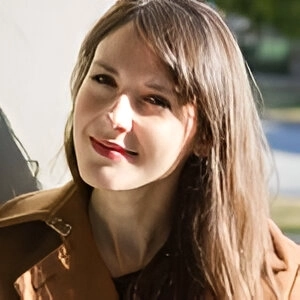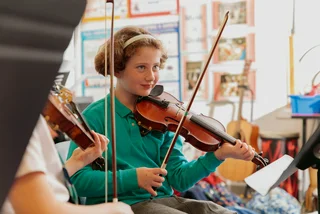Mark Buckley has worked at Prague British International school for 12 years and has served as the coordinator of its International Baccalaureate program since August 2022. He’s been an acolyte for IB education for even longer. Now, as PBIS enrolls higher and higher numbers of students—and as recent graduating classes achieve record-breaking examination results—Mark finds himself in the enviable position of working a job where he says even the administrative tasks are a pleasure.
I caught up with Mark in July to hear about what sets IB apart, why the program appeals to both local and foreign families in Prague, and why working at PBIS is nothing short of “a dream.”
Expats.cz: Can I ask you to tell me a little bit about your background and how you came to do what you do?
Mark Buckley: Sure. I actually studied fine arts at college, working in sculpture and painting, and I always worked in education on my summer holidays, breaks and things. So I fell naturally into education and immediately thrived as an art teacher in Liverpool.
But still it was quite insular. I didn't realize that I was sort of constrained by the UK view. And I think in a way I only realized after leaving the UK, wanting to branch out internationally, that different curricula change throughout the world according to the political sway in each country at a certain time. We can see in most countries that governmental changes lead to different priorities in education, not always with a long-term view and not always strategic or for educational progress.
What I found was that the IB actually provided a more stable platform because the trends and changes that drive the curriculum in any subject are not top-down or agenda-driven. They're more based on what global universities want and the skills that employers are actually looking for. So undergraduates coming through the IB program tend to be some of the strongest because the program is not influenced by the political sway at any particular given time.
When I joined an IB school as an art teacher, I immediately found that the curriculum was steps ahead of anything I used to teach. It's not called the International Baccalaureate for no reason or by coincidence. It really is an international education. And that’s what we’re all about at PBIS!
The program was set up to be that way. It grew out of the 60s in Switzerland, as a group of educators tried to get together to provide something that would prepare students for university wherever they were in the world.
I don't think it's any coincidence that the program emerged at around the same time as institutions like the UN, because more and more people would be living internationally, needing English as a language to help them move from place to place around the world.
It was also built in this spirit of cooperation, international-mindedness, growth—things that are really still relevant, if not more relevant today than ever.
What does the student body at PBIS look like?
The body of students we have is incredibly international, from all corners of the world. A good proportion of Czech locals as well as native English speakers, students from South Korea and China as well as different European countries, the USA, Canada, the Middle East. There is no prevailing culture. The IB gives students the chance to learn a program that can be transferred internationally and is respected internationally across the world.
We have one of the largest IB graduating classes of 2024, and it's been growing year on year. There’s a mistaken view of larger organizations that they're less personal, but actually I find with IB subject delivery, scale means that you can employ specialists across a range of subjects. We have specialist politics teachers, we have specialist psychology teachers…where schools often employ jacks-of-all-trades, our size means our teachers are all specialists and our curriculum is therefore very personalized.
That delivers a certain level of ambition in what students are actually achieving at the end of their courses that goes simply beyond assessment—to achieve a more professional, more creative, and more innovative educational experience.
I'm interested that you mentioned Czech families. Do you think those families’ motivations for enrolling their children at PBIS are different from those of international families?
Not really. Every family wants their children to be happy and successful. Our families all come to us wanting their children to have an open mind about the world and achieve a depth of knowledge in all of their subjects to access the top universities. There are certain styles and approaches to parenting and teaching that may be more or less pastoral versus academic and a little bit more on the holistic side as opposed to truly academic. But there is nobody who is, if you like, one-style only. I think all of our families span that breadth.
I'm curious about the word “holistic,” which music teacher Sheonagh Donaldson used when we spoke earlier this summer about PBIS’s relationship with the Juilliard School. Tell me about what you mean when you use that word.
Well, a holistic approach to education begins with the core of the child, developing a sense of identity, personal pride, acceptance and confidence and respect in any classroom and in any subject. That's the foundation that the IB education, and PBIS as well, strives to create.
What do you like best about your work?
I think it's the chance to innovate and the chance to continually keep reinventing, working on quality and doing new things every day. It's a dream.
And I'd say something else as well. Other colleagues have said this, but when an idea leads to something as well-designed as the IB program, all of its policies kind of sing. It’s really kind of a perfect philosophy for education.
When you talk about international mindedness and progressive education, and you read through the policies and even the standards and practices that you have to fulfill, and you actually find yourself agreeing so much with them that it's a pleasure to read policy documents? In the past few years, I've become a bit of an IB geek. It's a pleasure to actually be engaged in some of these things, even on an administrative level.
This article was written in cooperation with Prague British International School. Read more about our partner content policies here.
Learn more about the IB program at PBIS
To receive our latest PBIS information pack about our IB Program, including benefits, pricing, and enrollment, please leave your details below. We will send it directly to your email for consideration.












 Reading time: 5 minutes
Reading time: 5 minutes 





















